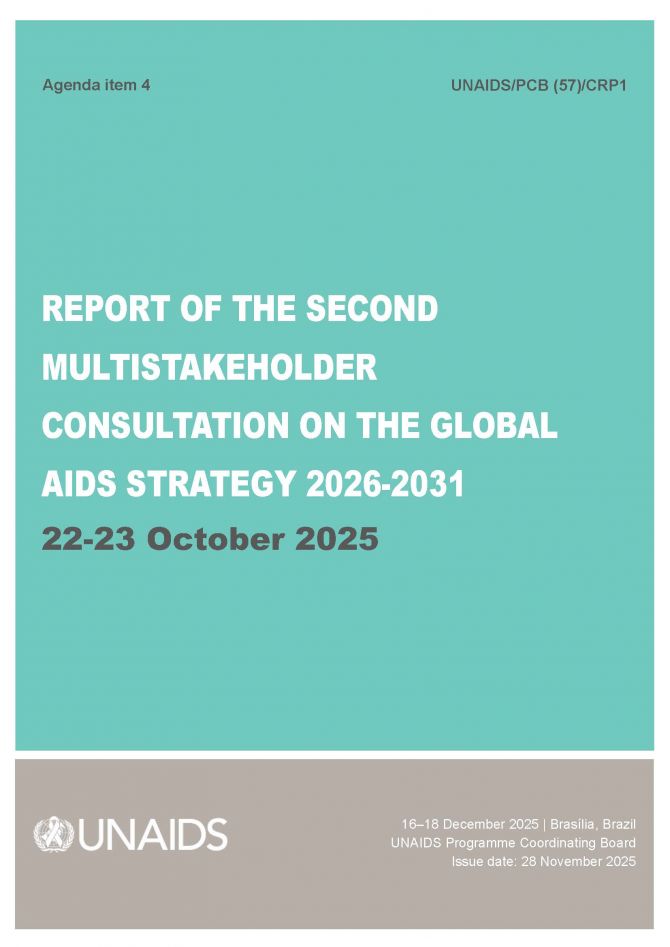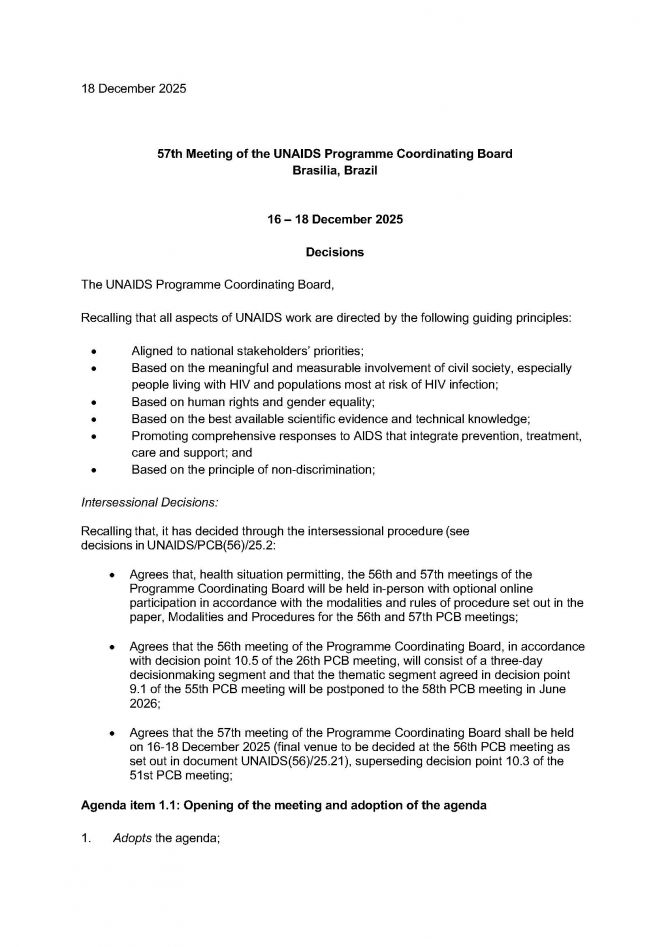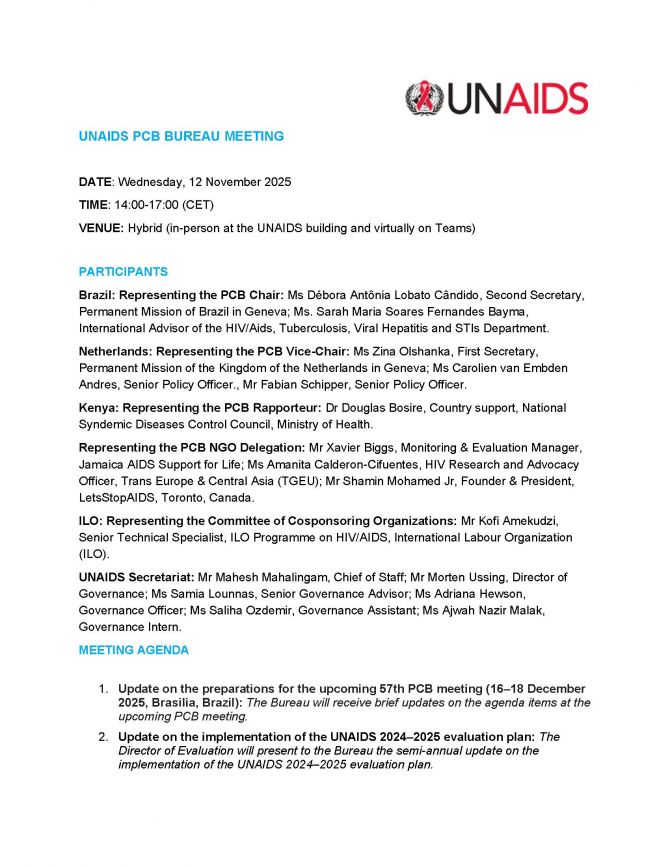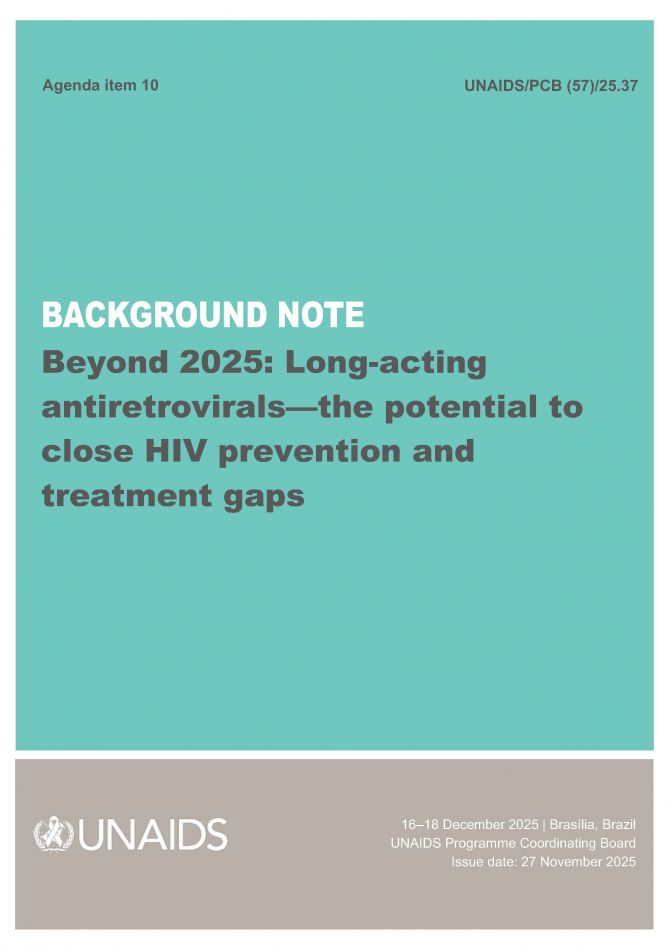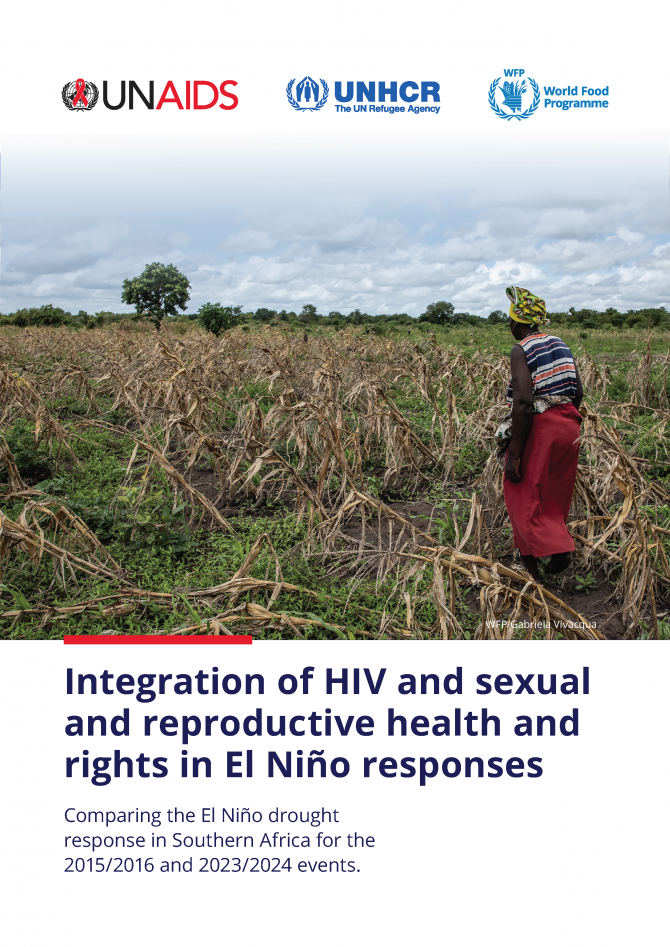
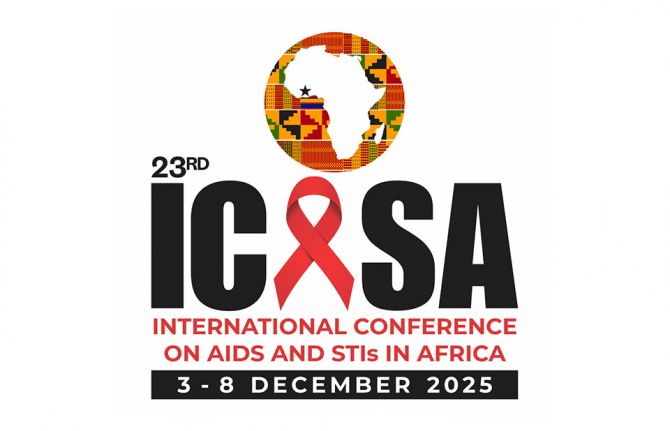
Media Advisory
UNAIDS is calling for the safeguarding of the global HIV response at the International Conference on AIDS and STIs in Africa (ICASA) in Ghana
02 December 2025 02 December 2025UNAIDS is participating in the 23rd International Conference on AIDS and STIs in Africa (ICASA) which is taking place in Ghana’s capital Accra, between 3-8 December.
At ICASA, UNAIDS will call on African leaders to accelerate efforts to strengthen and sustain their national HIV responses through renewed political commitment, domestic investments and international solidarity.
The HIV response is facing one of the biggest disruptions following funding cuts from international donors which has had severe consequences for African countries most affected by HIV. These cuts threaten to reverse the gains made over the past two decades, including expanding access to lifesaving HIV prevention and treatment in sub-Saharan Africa.
With new, long-acting HIV prevention innovations coming to market which could revolutionize HIV prevention efforts and stop new HIV infections UNAIDS is calling for solidarity, commitment and concerted efforts by donors, governments and communities to end AIDS by 2030.
WHEN: 3-8 December 2025
WHERE: Accra International Conference Centre, Castle Rd, Accra, Ghana
WHO: Winnie Byanyima, UNAIDS Executive Director, UNAIDS
Angeli Achrekar, Deputy Executive Director UNAIDS
and other regional and country representatives.
FOR INTERVIEWS PLEASE CONTACT:
Bathsehba Okwenje | tel. +27 63 585 5665 | okwenjeb@unaids.org
Robert Shivambu | tel. +27 83 608 1498 | shivambuh@unaids.org
UNAIDS
The Joint United Nations Programme on HIV/AIDS (UNAIDS) leads and inspires the world to achieve its shared vision of zero new HIV infections, zero discrimination and zero AIDS-related deaths. UNAIDS unites the efforts of 11 UN organizations—UNHCR, UNICEF, WFP, UNDP, UNFPA, UNODC, UN Women, ILO, UNESCO, WHO and the World Bank—and works closely with global and national partners towards ending the AIDS epidemic by 2030 as part of the Sustainable Development Goals. Learn more at unaids.org and connect with us on Facebook, Twitter, Instagram and YouTube.
Contact
Bathsehba Okwenjetel. +27 63 585 5665
okwenjeb@unaids.org
Robert Shivambu
tel. +27 83 608 1498
shivambuh@unaids.org


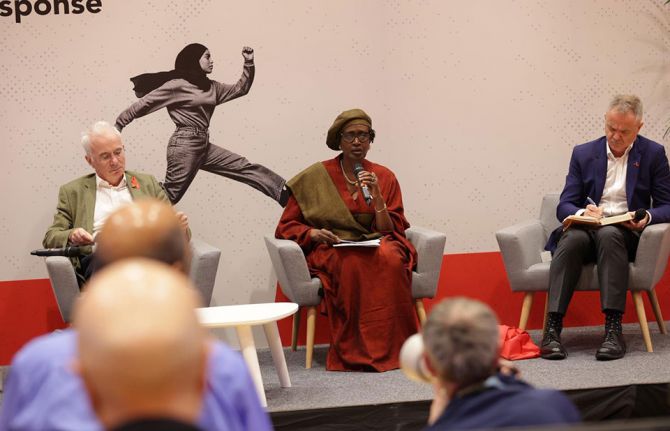
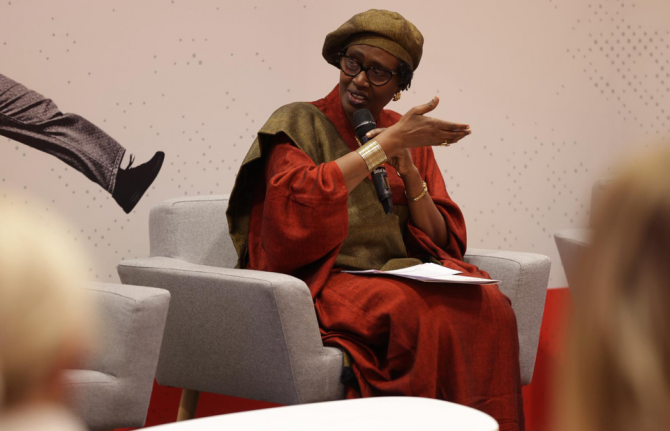
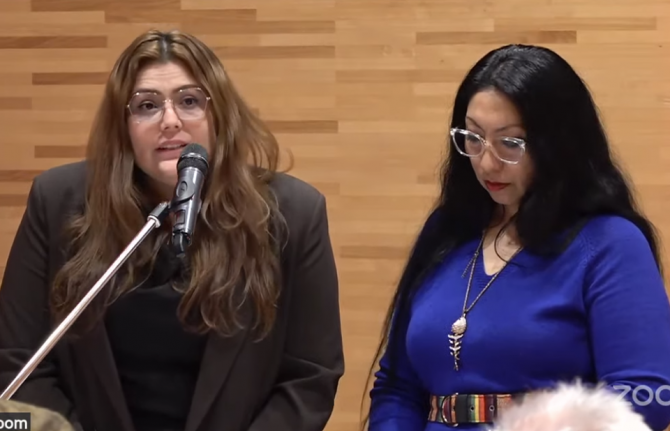
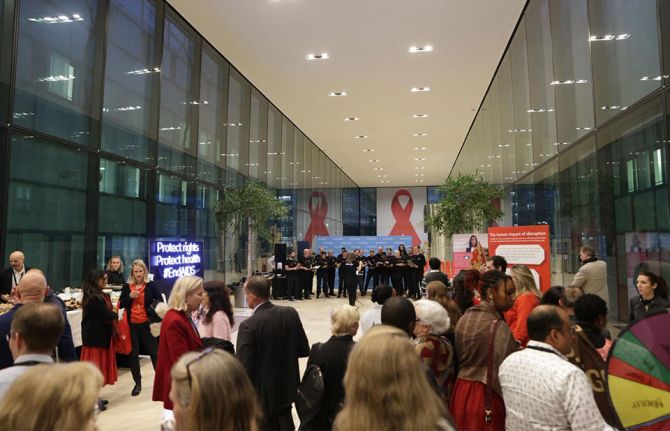
Press Statement
UNAIDS, WHO and the Global Fund call for political leadership, international cooperation, and community-led approaches at a joint World AIDS Day event
01 December 2025 01 December 2025GENEVA, 1 December 2025—UNAIDS, WHO and the Global Fund brought together members of communities, civil society organizations and government representatives to commemorate this year’s World AIDS Day at an event at UNAIDS headquarters in Geneva, Switzerland.
“Our progress is fragile and is now under threat due to the collapse of international assistance and the regression on human rights,” said Winnie Byanyima, UNAIDS Executive Director. In 2025, a historic funding crisis threatened to unravel decades of progress. HIV prevention services were severely disrupted. Community-led services, vital to reaching marginalized populations were also deprioritized while the rise in punitive laws criminalizing same-sex relationships, gender identity, and drug use amplified the crisis, making HIV services inaccessible to many.
Speakers during three separate panels noted that the global AIDS response had suffered severe setbacks and stressed that much more needs to be done to end AIDS as a public health threat by 2030. They focused on the fact that AIDS is not over and given today’s environment, a new transformative approach is needed to mitigate risks and not get derailed completely.
Ways forward mentioned involved finding alternative sources of funding, community leadership and a push for innovation as well as a call for unity.
“What keeps us going is resilience, innovation and community strength but resilience alone cannot sustain the health system,” said Pasquine Ogunsanya, Executive Director of Alive Medical Services, from Uganda.
A sentiment echoed by Peter Sands, The Global Fund Executive Director. “Innovation is the only way to sustain progress while doing it with less money,” he said.
Participants also called on countries and the international community to come together to bridge the loss of resources, support countries in closing the remaining gaps in HIV prevention and treatment services, remove legal and social barriers, and empower communities more.
“Without the support from international organizations, communities, civil society, governments and the private sector, no one actor will be able to deliver on the promise of lenacapavir,” said Tenu Avafia, UNITAID Deputy Executive Director.
Lenacapavir is a twice-yearly HIV-prevention injectable drug shown to reduce the risk of HIV transmission by 99%. The drug's first public rollouts have started in eastern Africa, which has one of the world's highest HIV burden.
The World AIDS Day joint event also paid tribute to the millions of lives lost to AIDS by lighting a candle and one minute of silence. Keren Dunaway, Programme Officer with ICW and LLAVES, an organization that defends the rights of people living with HIV said, “We recommit to ensuring that everyone living with HIV has access to the treatment they need, to services to prevent new infections, and that we can and will end AIDS together.”
QUOTES:
"As the governments, funders and global leaders continue to debate and decide how global resources should be allocated, let me remind you this: As young people we are not statistics. We are not graphs on a powerpoint presentation. So when you are cutting those budget lines, you are cuting our lives. When you are withdrawing the funding, you are withdrawing us, you are denying us an opportunity to thrive and an opprtunity to survive and achieve our hopes and dreams for the future." Paul Mavesere Ndhlovu, Peer Provider/HIV Advocate, Zvandiri, Zimbabwe.
"We will keep fighting, we will keep the commitment because we are doing it for the people who would otherwise be in the cementary but are here now to celebrate life." Gracia Violeta Ross, HIV Lead, World Council of Churches.
Watch the event
Continued here:

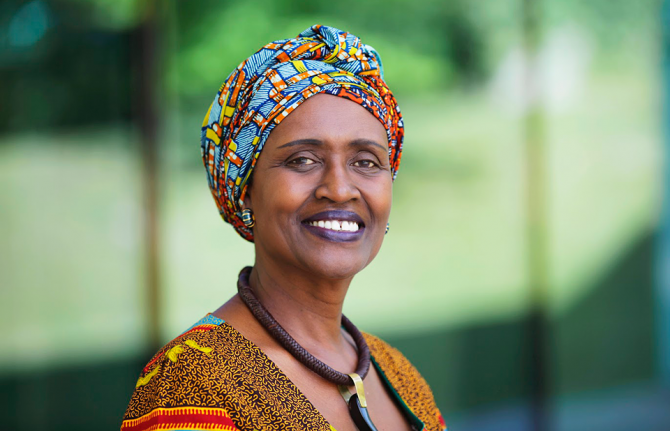
Press Statement
World AIDS Day 2025 — Message from Winnie Byanyima, Executive Director of UNAIDS
01 December 2025 01 December 2025This World AIDS Day, fragile progress is under threat.
Let me tell you about Noncedo Khumalo, a 24-year-old peer mentor in Eswatini. She supported women and girls in her community at risk of HIV, especially from older men who target them for transactional sex. But now, the programme funding her work has been terminated, and Noncedo has lost her job.
She is worried about the future. Many of the young women and girls she worked with are not well informed about HIV. Losing a peer mentor – a person like them, whom they can trust – puts them at risk of HIV infection.
Noncedo is not the only one.
Over 60% of all women-led HIV organizations have lost funding or been forced to suspend work. Other HIV prevention services have been hit hard too. The number of people using PrEP—HIV prevention medicines—has fallen by 64% in Burundi, 31% in Uganda and 21% in Viet Nam.
All this comes amid a regression in human rights. The number of countries criminalising same-sex relationships has increased this year with Burkina Faso, Niger, Mali and Trinidad and Tobago introducing criminalization. And this amidst a broader wave of new regressive legislation.
In the last 12 months alone, 316 million women were subjected to physical or sexual violence by an intimate partner. Laws protecting the bodily autonomy and sexual and reproductive rights of adolescent girls and women are under threat. Some countries have come close to repealing laws banning female genital mutilation.
In Sub-Saharan Africa, women who have experienced intimate partner violence in the past year are 3.2 times more likely to acquire HIV.
Make no mistake, there is a determined, organized, and well-funded campaign against human rights – particularly the rights of women and girls and LGBTIQ+ people. This campaign is pushing people further away from lifesaving HIV services
Yet in the hardest of circumstances, I am hopeful that we can overcome disruption and transform the AIDS response.
I take incredible inspiration from the communities, leaders, and civil society organisations who have rallied to support each other and the AIDS response.
Many governments have taken action to increase domestic funding for health and HIV funding. That has enabled some countries to maintain or even increase the number of people receiving HIV treatment.
The African Union Roadmap to 2030, adopted by Member States in 2025, focuses on sustaining the HIV response and strengthening health systems. The recently launched Accra Reset places health financing and sovereignty at the heart of a transformed development ecosystem.
UNAIDS is supporting countries to increase domestic financing for HIV. So far, 25 countries have developed their own HIV sustainability roadmaps towards a future HIV response, that is more self-reliant, better integrated into the broader health system, and that keeps communities at the centre.
However, with revenue collection in Africa at just 16% of GDP – far lower than the global average – there is only so much governments can do. Health taxes and other innovative measures can be helpful in the short term. But for serious domestic HIV financing, low and middle-income countries need continued economic growth, curbing of tax dodging, and progressive taxation of income, wealth, and corporate profits.
A major barrier is that the countries with the highest HIV burdens are also some of the world’s most indebted. Interest rates have spiked, with debt repayments now exceeding health budgets in many low and middle income countries.
This year’s Financing for Development Conference and G20 Summit highlighted the problem and urgent need for action. But in 2026, governments need to make debt restructuring a reality, allowing countries to increase their domestic HIV and health spending.
The good news is that some countries are advancing human rights. In Rwanda, for example, adolescents can now access sexual and reproductive services without parental consent from the age of 15 – empowering young people to protect their health and keep themselves safe.
The first doses of Lenacapavir, the new, twice-yearly PrEP injections have arrived in Africa. The rollout is not moving fast enough, too few manufacturers have been licensed to produce a generic version, and too many developing countries have been excluded from accessing a generic. This is fundamental issue of justice.
And in a tough financial landscape, donor governments are not walking away. The America First Global Health strategy is continuing significant investment in the HIV response. And the eighth replenishment of the Global Fund to Fight AIDS, Tuberculosis and Malaria has secured pledges of more than US$ 11.34 billion so far – with several more major pledges expected.
Developing countries are beginning the gradual transition towards more sustainable, inclusive, and nationally owned HIV responses. That is how we can overcome disruption and end AIDS as a public health threat.
There is no silver bullet. No one measure alone will get us there. But if governments, communities, and international organisations can come together to unlock domestic HIV financing, protect human rights and gender equality, and make new innovations affordable and accessible for all, we can seize this moment. The world can end AIDS.
UNAIDS
The Joint United Nations Programme on HIV/AIDS (UNAIDS) leads and inspires the world to achieve its shared vision of zero new HIV infections, zero discrimination and zero AIDS-related deaths. UNAIDS unites the efforts of 11 UN organizations—UNHCR, UNICEF, WFP, UNDP, UNFPA, UNODC, UN Women, ILO, UNESCO, WHO and the World Bank—and works closely with global and national partners towards ending the AIDS epidemic by 2030 as part of the Sustainable Development Goals. Learn more at unaids.org and connect with us on Facebook, Twitter, Instagram and YouTube.
Related resources


